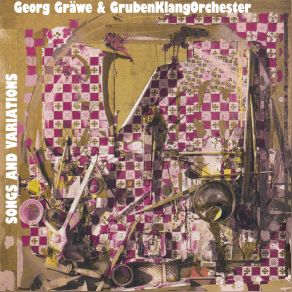Songs and Variations
Download links and information about Songs and Variations by Georg Gräwe / Georg Grawe, Grubenklangorchester. This album was released in 1991 and it belongs to Jazz, Contemporary Jazz, Classical genres. It contains 3 tracks with total duration of 01:02:08 minutes.

|
|
|---|---|
| Artist: | Georg Gräwe / Georg Grawe, Grubenklangorchester |
| Release date: | 1991 |
| Genre: | Jazz, Contemporary Jazz, Classical |
| Tracks: | 3 |
| Duration: | 01:02:08 |
| Buy it NOW at: | |
| Buy on iTunes $9.99 | |
Tracks
[Edit]| No. | Title | Length |
|---|---|---|
| 1. | East Coker | 15:36 |
| 2. | Lookin' for Work | 14:24 |
| 3. | Variations for Chamber Ensemble | 32:08 |
Details
[Edit]Piano and composition terrorist Georg Gräwe has assembled a ten-piece chamber orchestra full of notorious improvisers. Among them: vocalist Phil Minton, trombone experimentalist Radu Malfatti, and violinist extraordinaire Philipp Wachsmann. As is always the case with Gräwe, there is a very intricate method to his own warm, humorous brand of musical madness. The band is structured in halves between those who are well acquainted with jazz and those who work well-written scores. Each song form and its attendant variation are written for the express purpose of being able to integrate composition and free music and jazz into the body of the tune but also have them be distinguishable. To this end, the musicians have been chosen carefully. Phil Minton, for instance was selected for his ability to bring a listener into the ever-shifting colors and nuances of a music that is never static, and goes from played score to free improvisation in the blink of an eye. His lyrics, though existential, examine the process of creation — only metonymically musical — and carry into the sonic framework an adaptability that leaves open spaces for the listener to follow him in. If you are listening along the lyric line, when it ends, you are in the center of the lyric's meta-text: the sophisticated sonic, post-Webern architecture that Gräwe has wrought among his instrumentalists. Individual nuances and strengths are considered — especially since this was recorded live — for how they put the music across to those in the audience, not for how they serve the music. Gräwe is confident enough in his compositions to be able to do that. Given that there are only two selections here (one with lyrics by T.S. Eliot — yawn — and one by Manfred Karge) and only three tunes in the whole set, it all comes off as a piece. It's essentially a three-movement, free jazz symphony with harmonic ideas flooding the color and texture fields and a sophisticated polyphony worked out between reeds and woodwinds that is just staggering, especially in "Variations for Chamber Ensemble"'s mid-section near the end of the recording. Gräwe's taken the notion that there is nothing new under the musical sun and, once again, turned it on its head.